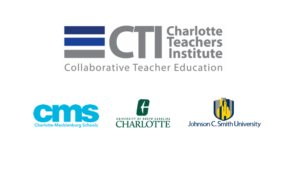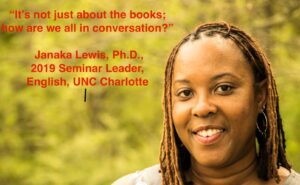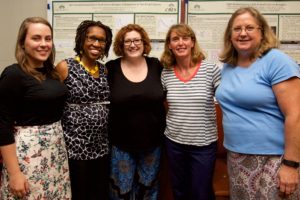StaceyAnne Hartberger, Science, Druid Hills Academy



CTI FELLOWS TRANSFORM THEIR THEMSELVES! - My Tweets
Follow me on Twitter
StaceyAnne Hartberger, Science, Druid Hills Academy



 Home
Home About CTI
About CTI
 Seminars
Seminars
 2024 Seminars
2024 Seminars
 2024 CTI Fellows
2024 CTI Fellows Documenting the Modern Black Freedom Struggle in Charlotte, NC
Documenting the Modern Black Freedom Struggle in Charlotte, NC Teaching Beyond the Text: Incorporating Artists into the Humanities Classroom
Teaching Beyond the Text: Incorporating Artists into the Humanities Classroom Using Popular Culture to Teach Critical Thinking
Using Popular Culture to Teach Critical Thinking American Blindspot: Revealing the Tangled Roots of Race, Religion, and Politics in US National Culture
American Blindspot: Revealing the Tangled Roots of Race, Religion, and Politics in US National Culture Thinking Through Artificial Intelligence Using Literature
Thinking Through Artificial Intelligence Using Literature Integrating Aging Education in the PK-12 Curriculum: Combating Ageism through the Classroom
Integrating Aging Education in the PK-12 Curriculum: Combating Ageism through the Classroom Needless Suffering: Critical Theory and the Classroom
Needless Suffering: Critical Theory and the Classroom 2023 Seminars
2023 Seminars
 2023 CTI Fellows
2023 CTI Fellows The Graphic Novel
The Graphic Novel Race, History, Change, and Social Activism: Baseball’s Impact on America
Race, History, Change, and Social Activism: Baseball’s Impact on America All Roads of Thought Run Through Oz: Teaching Any Topic using The Wizard of Oz
All Roads of Thought Run Through Oz: Teaching Any Topic using The Wizard of Oz A Freshwater Splash: Urban Stream Ecology and Biodiversity
A Freshwater Splash: Urban Stream Ecology and Biodiversity The Importance of Repetition: Dance and Culture
The Importance of Repetition: Dance and Culture Reflection and Its Role in our Cycle of Continuous Improvement
Reflection and Its Role in our Cycle of Continuous Improvement Creating a Balanced and Equitable Learning Culture
Creating a Balanced and Equitable Learning Culture It Takes a Candidate
It Takes a Candidate 2022 Seminars
2022 Seminars
 2022 CTI Fellows
2022 CTI Fellows Exploring Memory and Race in America
Exploring Memory and Race in America Life Narratives in the Classroom and Beyond
Life Narratives in the Classroom and Beyond Understanding the Science of Light: A Hands-on Approach to Learning with Implications for STEM Around the World
Understanding the Science of Light: A Hands-on Approach to Learning with Implications for STEM Around the World What is Identity?
What is Identity? Charlotte as Teaching Canvas: Creating Culturally Responsive Classrooms and Equity-Mindsets by Engaging in Local African, Latinx, and Southeast Asian Diasporic Spaces
Charlotte as Teaching Canvas: Creating Culturally Responsive Classrooms and Equity-Mindsets by Engaging in Local African, Latinx, and Southeast Asian Diasporic Spaces Carolina Cuisine: Understanding the History and Science Behind the Evolution of our Crops and Food
Carolina Cuisine: Understanding the History and Science Behind the Evolution of our Crops and Food Moving to Learn: Experience, Embodiment, and Transformative Teaching
Moving to Learn: Experience, Embodiment, and Transformative Teaching 2021 Seminars
2021 Seminars
 2021 CTI Fellows
2021 CTI Fellows Southern Children’s Literature in the Classroom
Southern Children’s Literature in the Classroom Using Digital Mapping to Study History, Race, and Gentrification
Using Digital Mapping to Study History, Race, and Gentrification Addressing Childhood and Adolescent Mental Health in the Classroom
Addressing Childhood and Adolescent Mental Health in the Classroom Embodied Teaching and Learning
Embodied Teaching and Learning Climate Refugee Stories
Climate Refugee Stories The Philosophical Foundations of Education
The Philosophical Foundations of Education “Oh My, Aren’t You Wearing Some Nice Plastic!”: The Chemistry and Culture of Black Women’s Hair
“Oh My, Aren’t You Wearing Some Nice Plastic!”: The Chemistry and Culture of Black Women’s Hair The Essential Peace: Innovating and Integrating Action Peacebuilding in the Classroom
The Essential Peace: Innovating and Integrating Action Peacebuilding in the Classroom 2020 Seminars
2020 Seminars
 2020 CTI Fellows
2020 CTI Fellows African American Poetry & the Idea of Citizenship
African American Poetry & the Idea of Citizenship “You were IN the Water?” Urban Waterways: Problems and Opportunities
“You were IN the Water?” Urban Waterways: Problems and Opportunities Narratives of Muslim Life in America
Narratives of Muslim Life in America WWI and the Shaping of the Twentieth Century
WWI and the Shaping of the Twentieth Century Illuminate Yourself! The Science of Glow
Illuminate Yourself! The Science of Glow Anti-Racism and Pedagogy: What Does it Mean to be an Anti-racist Teacher?
Anti-Racism and Pedagogy: What Does it Mean to be an Anti-racist Teacher? Mindfulness & Education: Transforming Learning Through Awareness
Mindfulness & Education: Transforming Learning Through Awareness Black Girl Magic (Mis)Understood: Representations and Perceptions of Black Women and Girls in the Education System
Black Girl Magic (Mis)Understood: Representations and Perceptions of Black Women and Girls in the Education System 2019 Seminars
2019 Seminars
 2019 CTI Fellows
2019 CTI Fellows Frankly Speaking: White Privilege
Frankly Speaking: White Privilege How to Build a Human
How to Build a Human Childhood and the City Space in Literature
Childhood and the City Space in Literature Children in War and Conflict
Children in War and Conflict Climate Science and Solution Strategies
Climate Science and Solution Strategies Africa: Beneath the Headlines
Africa: Beneath the Headlines Writing in Mathematics
Writing in Mathematics Time Travel: Using Music to Explore Past, Present, and Future Messages
Time Travel: Using Music to Explore Past, Present, and Future Messages 2018 Seminars
2018 Seminars
 2018 CTI Fellows List
2018 CTI Fellows List The Art and Chemistry of Light
The Art and Chemistry of Light It’s About Time
It’s About Time Nurturing Nature: Epigenetics as a Way to Explore Social Justice
Nurturing Nature: Epigenetics as a Way to Explore Social Justice Writing about Our Lives: A Genre Study of Memoir
Writing about Our Lives: A Genre Study of Memoir Exploring American Sacred Values
Exploring American Sacred Values “A Person’s a Person No Matter How Small”: Teaching Human Rights
“A Person’s a Person No Matter How Small”: Teaching Human Rights Insights into Latino Communities in Charlotte Today
Insights into Latino Communities in Charlotte Today Animals, Culture, and Society
Animals, Culture, and Society 2017 Seminars
2017 Seminars
 2017 CTI Fellows List
2017 CTI Fellows List Using Mathematics to Understand Social Issues
Using Mathematics to Understand Social Issues Media and Minorities: Unpacking Stereotypes
Media and Minorities: Unpacking Stereotypes Chemical Interactions in the Body
Chemical Interactions in the Body Memorials, Memories, and American Identity
Memorials, Memories, and American Identity Doing Science: Hands-On Learning in the Laboratory
Doing Science: Hands-On Learning in the Laboratory Cultivating Visual Literacy
Cultivating Visual Literacy The Rise (and Fall) of Democracies around the World
The Rise (and Fall) of Democracies around the World From Self to Students: Canvassing Art to Explore Identity
From Self to Students: Canvassing Art to Explore Identity 2016 Seminars
2016 Seminars
 2016 CTI Fellows List
2016 CTI Fellows List Literacy and Literacies in the 21st Century
Literacy and Literacies in the 21st Century How Science is Done: A Behind the Scenes Look at Scientific Research
How Science is Done: A Behind the Scenes Look at Scientific Research The Many Faces of Capitalism around the Globe — Past and Present
The Many Faces of Capitalism around the Globe — Past and Present Writing with Power: No Fear Here
Writing with Power: No Fear Here FUNdamental Ideas in Math for Grades PreK-12
FUNdamental Ideas in Math for Grades PreK-12 It’s a Small World! Exploring Science at the Tiniest Scale
It’s a Small World! Exploring Science at the Tiniest Scale Tracing the Legacy of Hispanic Cultures — 1492 to Today
Tracing the Legacy of Hispanic Cultures — 1492 to Today Exploring Memoir — From Picture Book to Digital Story
Exploring Memoir — From Picture Book to Digital Story 2015 Seminars
2015 Seminars
 2015 CTI Fellows List
2015 CTI Fellows List Exercise and the Brain
Exercise and the Brain What Makes a Nation?
What Makes a Nation? The Origins of Human Language
The Origins of Human Language Fundamentals of Mathematics: Problem Solving and Process Standards
Fundamentals of Mathematics: Problem Solving and Process Standards Peace Education: Psychological Factors that Endorse War
Peace Education: Psychological Factors that Endorse War Integrating Concepts in Life Sciences
Integrating Concepts in Life Sciences Africa: Moving Beyond Popular Culture
Africa: Moving Beyond Popular Culture Supernatural Figures in Theatre, Film and the Brain
Supernatural Figures in Theatre, Film and the Brain 2014 Seminars
2014 Seminars
 2014 CTI Fellows List
2014 CTI Fellows List Artificial Intelligence
Artificial Intelligence The Global Energy Challenge
The Global Energy Challenge Metamorphosis: Transformative Experiences
Metamorphosis: Transformative Experiences Intersections of Science, Technology and Culture
Intersections of Science, Technology and Culture Human Agency
Human Agency The Art of Fiction: Close Analysis, Style and the Novel
The Art of Fiction: Close Analysis, Style and the Novel Visual Storytelling in Children’s and Young Adult Literature at the Harvey B. Gantt Center for African-American Arts + Culture
Visual Storytelling in Children’s and Young Adult Literature at the Harvey B. Gantt Center for African-American Arts + Culture Heroes, Rebels and Rock Stars: Cultural Icons in Modern Europe
Heroes, Rebels and Rock Stars: Cultural Icons in Modern Europe 2013 Seminars
2013 Seminars
 Charlotte as a New South City: Using the Collections at the Levine Museum of the New South
Charlotte as a New South City: Using the Collections at the Levine Museum of the New South The Nature of Energy: How We Use and Store It to Power Our Everyday Lives
The Nature of Energy: How We Use and Store It to Power Our Everyday Lives Math and Sports
Math and Sports Imagining Modern Bodies: Disability and Art at the Bechtler Museum of Modern Art
Imagining Modern Bodies: Disability and Art at the Bechtler Museum of Modern Art Grammar for the Real World
Grammar for the Real World Human Social Groups
Human Social Groups Chemical Magic
Chemical Magic Urban Encounters: Hispanic and African American Literature
Urban Encounters: Hispanic and African American Literature 2012 Seminars
2012 Seminars
 African American Literature of the Civil Rights Movement
African American Literature of the Civil Rights Movement All Immigration is Local: Exploring the New Geography of Immigration
All Immigration is Local: Exploring the New Geography of Immigration American Political Parties: Their Failures and Their Futures
American Political Parties: Their Failures and Their Futures Entertaining with Math
Entertaining with Math Environmental Science and Climate Change
Environmental Science and Climate Change Reading African American Lives
Reading African American Lives Reading Media Imagery: Critical Thinking and Literacy
Reading Media Imagery: Critical Thinking and Literacy The Science of NASCAR
The Science of NASCAR 2011 Seminars
2011 Seminars 2010 Seminars
2010 Seminars 2009 Seminars
2009 Seminars Applications
Applications
 Curriculum Units
Curriculum Units Events
Events Evaluation
Evaluation SRET
SRET
 “What’s My WHY in CTI?” Videos
“What’s My WHY in CTI?” Videos
Proudly powered by WordPress